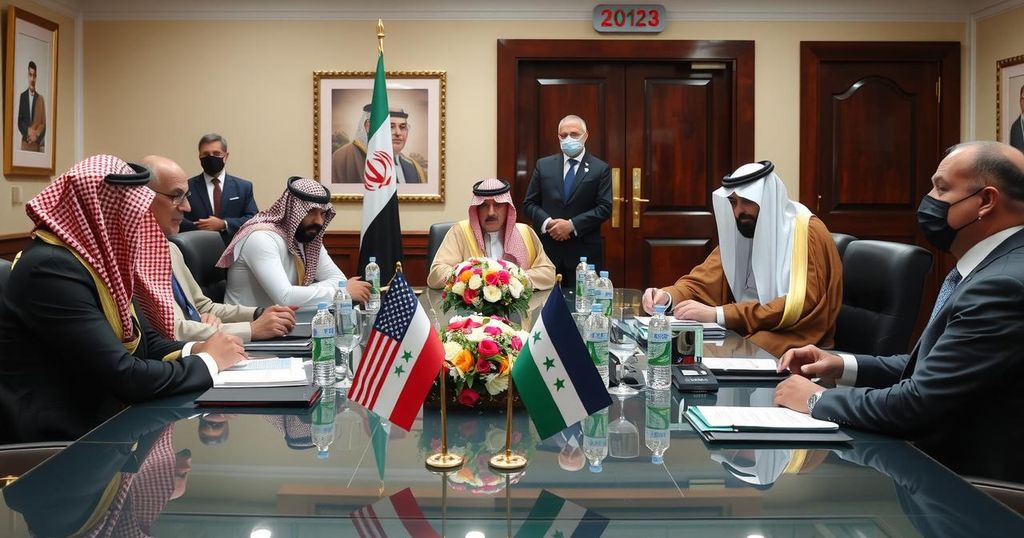Top diplomats from the Middle East and Europe convened in Saudi Arabia for discussions on supporting Syria after the regime change. The talks, involving countries such as Turkey, France, and the European Union, centered on potential sanctions relief contingent upon the new Syrian government’s inclusivity. Saudi Arabia’s engagement marks a shift in its previous stance, aiming to influence the new leadership while addressing humanitarian needs.
Diplomats from the Middle East and Europe convened in Saudi Arabia to discuss support strategies for Syria following the recent regime change. The gathering, which took place over two sessions, initially engaged Arab officials and subsequently expanded to include representatives from Turkey, France, the European Union, Britain, and the United Nations. These discussions were framed within the context of Syria’s new leadership under Ahmed al-Sharaa, who is advocating for the lifting of sanctions imposed by Western powers in response to the previous government’s human rights violations.
The talks come in the wake of over 13 years of conflict that have devastated Syria, resulting in significant loss of life, economic ruin, and mass displacement. Kaja Kallas, the EU’s chief diplomat, indicated that sanctions could be reconsidered provided that the new Syrian rulers establish a government inclusive of all factions. Saudi Arabia’s evolving role is marked by its recent engagement with the new leadership, following a historical stance against the Assad regime, as the Kingdom initiated aid efforts by sending vital supplies to Syria’s war-affected population.
Furthermore, the United States is participating in these discussions, emphasizing the necessity for regional stability to thwart terrorist activities and to maintain the pressure against the Islamic State group. While Saudi Arabia’s approach has remained measured compared to that of Turkey and Qatar, there is a strategic desire to influence the new Syrian government ahead of others, seeking stability and control over radical factions. This summit signifies Saudi Arabia’s ambition to take charge of concerted regional initiatives to support Syria’s recovery and reconstruction efforts.
The discussions regarding Syria’s future have gained prominence in light of the recent political shifts following the ousting of Bashar al-Assad. The new regime, under Ahmed al-Sharaa, seeks international support and the easing of sanctions that have stifled the country’s economy. With the European Union and the United States keen to reshape their approach towards Syria, the collaborative efforts from Middle Eastern nations, particularly Saudi Arabia, indicate a significant strategic pivot in the region’s diplomatic landscape. The historical backdrop of the Syrian conflict, marked by extensive humanitarian crises and geopolitical tensions, complicates the prospects of recovery and governance.
In conclusion, the summit in Saudi Arabia represents a critical juncture for international and regional diplomacy concerning Syria. With discussions focused on sanctions, governance, and recovery, the meeting highlights the complexities of post-Assad Syria and the various diplomatic strategies being deployed to foster stability. As Saudi Arabia positions itself as a leading actor in these efforts, the outcomes of such discussions will be pivotal in shaping the future of the war-torn nation.
Original Source: www.voanews.com






